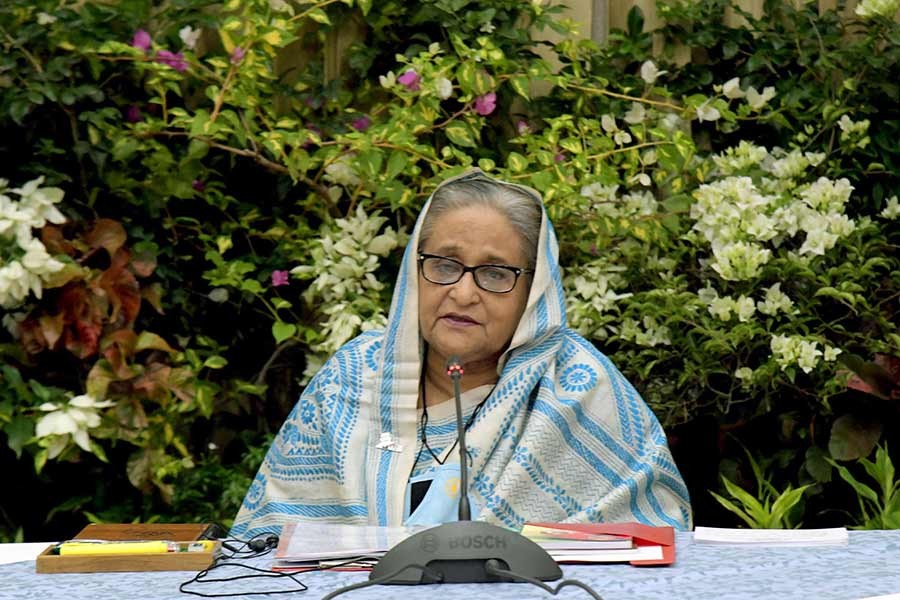Prime Minister Sheikh Hasina has urged the world leaders to form a strong partnership to say goodbye to the curse of homelessness, saying that she believes a safe and decent shelter is the basic right of every individual.
The prime minister made the call while addressing a side-event on ‘Sustainable and Affordable Housing’ during the 77th session of the UN General Assembly in New York on Wednesday, reports BSS.
Describing homelessness issue as very close to her heart, she shared her experiences in building sustainable houses for the underprivileged people across Bangladesh.
Sheikh Hasina said, “During my premiership of eighteen years, we have accommodated 3.5 million homeless people in more than half a million of houses. Construction of another 40 thousand houses is presently going on,” she said.
She pointed out that the Father of the Nation, Bangabandhu Sheikh Mujibur Rahman took initiatives to rehabilitate the landless, homeless and rootless people making it a development priority after Bangladesh’s independence.
Counting on the vision of the Father of the Nation, in 1997, the premier said, her government launched a project named ‘Ashrayan’ that means housing for landless-homeless people.
“For last two decades, my government has made the most sincere effort to ensure free of cost housing for all,” she said.
The prime minister said their coverage area is not only the cities, rather it includes every village, town, district, island and hilly region of the country.
On the occasion of birth centenary of the Father of the Nation Bangabandhu Sheikh Mujibur Rahman, this effort is rejuvenated with bigger standings, she said, adding that just in the last two years, they have built two hundred thousand homes which accommodate about one million people.
Under this project, each family is getting ownership of a brick-built house of 400 square feet area with two-bedrooms, one long verandah, a kitchen and a sanitary latrine, she said.
“We are providing free electricity connections, safe drinking water to every household. We are giving the house and the land with a sufficient homestead area free of cost, which is unique in the history of the world,” she said.
The beneficiaries of these houses are the landless-homeless, beggars, day labourers, destitute women, widows, persons with disabilities, elderly people, the victims of domestic violence, ethnic minority, third gender people, leprosy patients, sweepers, and Harijan community (so-called lower caste), she said.
She also mentioned that they are addressing the climate-victim families too. “We have already accommodated 5 thousand climate-refugee families in 139 multi-storey buildings in Cox’s Bazar.”
Previously, she said, it was a common scenario in Bangladesh that homeless people used to flock to the cities in search of employment and dwelling.
But, since the introduction of Ashrayan project, she said, this trend has almost stopped while these people are now self-employed in their own localities.
“We are following a model of `Inclusive Development.' The model ensures a holistic approach to make a rehabilitated person self-reliant and self-dignified with economic and social empowerment. The project ensures an equal share of ownership of the land and house for both husband and wife. House is the most basic need of every citizen of the country and it creates opportunities for fulfilling other needs,” she said.
In Bangladesh, the premier, said they have experienced that a home is not just a place to live rather housing security accelerates a person's economic emancipation and motivates them to live with dignity.
Sheikh Hasina said along with the provision of land and houses, they have made successful arrangements in sending children to primary schools.
Besides, she said, “To deliver primary healthcare, connections have been made with the nearby community clinics. The children and women receive thirty types of medicines free of cost. Homestead gardening, rearing poultry and fish production, including micro and small entrepreneurship activities led by women are in place. These interventions have made the initiative sustainable and eco-friendly.”
President of Malwai, Dr. Lazarus McCarthy Chakwera, Vice-Minister of Ministry of External Affairs of India, Sanjay Verma, Permanent Representative, Slovak Republic to the UN, Michal Mlynár and Director-General, ILO, Guy Ryder, also spoke on the occasion.


